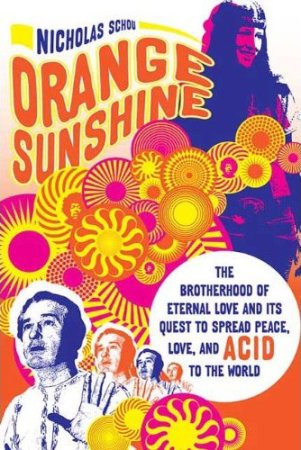The city of Oakland is about to take medical marijuana production to a new level. It just passed an ordinance that will allow for four city-permitted industrial-scale cultivation operations. Small- and medium-scale growers have not been included in the scheme yet, and while council members have said they will address that, the community is concerned and speaking out about it.
A comic turned activist and a madam turned convict are throwing a splash of color into an otherwise lackluster New York state campaign season. And they're doing it with a consistent anti-prohibitionist message.
In the late 1960s, a small group of California surf bums and teenage working-class troublemakers took LSD, found God, and set out to turn on the world. Nicholas Schou's "Orange Sunshine: The Brotherhood of Eternal Love and Its Quest to Spread Peace, Love, and Acid to the World," from St. Martin's Press, is their story.
Do you read Drug War Chronicle? If so, we need your feedback to evaluate our work and make the case for Drug War Chronicle to funders. We need donations too.
California cities and counties are laying off firefighters and police officers as they face a seemingly never-ending budget crisis. A new report from the state Legislative Analyst's Office says they could gain "hundreds of millions of dollars a year" if Proposition 19 passes. Hmmmm...
A new poll finds majority support for pot legalization and a strong majority who believe the drug war has failed, but a lot of people who blame Mexico for America's drug problem.
More bad apples in the Big Apple, a major drug corruption scandal brews in Tulsa, the city of Oakland pays big for bad cops, a Georgia deputy cops a plea, and a South Carolina state trooper goes down.
Last Friday, the Juarez Cartel unveiled a frightening tactical innovation: the car bomb. Meanwhile, the killing goes on...
The same folks who brought us the Oregon Medical Marijuana Act now want to add dispensaries to the mix, and their initiative has qualified for the November ballot.
Hawaii-based Roger Christie and his THC Ministry have been proselytizing for pot for years. Now, the feds have indicted him, and they've managed to persuade a federal judge that he's "too dangerous" to be allowed out on bail. Welcome back to Bizarro World.
Drug reformers have been grumbling about the Obama administration's decision to nominate acting DEA head Michele Leonhart to be permanent DEA administrator since it was announced. Now, a drug reform coalition is calling on Obama to withdraw her nomination, citing recent DEA raids on medical marijuana providers. But there's more than that.
Even though the European Union demands a free market and the free movement of people within its borders, the EU's Court of Justice has ruled that a Dutch border town can bar foreigners from buying pot there.
Events and quotes of note from this week's drug policy events of years past.
"Jane Hamsher Talks Marijuana Legalization on MSNBC," "Diane Feinstein Wants to Continue Arresting Marijuana Users, and Other News," "How to Get Arrested for Marijuana in One Easy Step," "The New Politics of Marijuana Reform," "DARE Attacks Marijuana Legalization While Praising Alcohol."
Apply for an internship at DRCNet and you could spend a semester fighting the good fight!
In a marathon session Tuesday night, the Oakland City Council Tuesday approved an historic plan for large-scale indoor marijuana farms, but only after hearing from a cavalcade of medical marijuana patients, growers, and dispensary operators intent on ensuring that small and medium-sized growers are not squeezed out.
While the
ordinance is aimed at medical marijuana, the council, which has endorsed the Proposition 19 tax and regulate cannabis initiative, clearly sees the potential for tax revenues and jobs under a perhaps not-so-distant marijuana legalization in California.
The council passed a proposal that will authorize city officials to issue permits for four indoor marijuana farms to supply the city's four allowed existing medical marijuana dispensaries. The ordinance sets no size limitations. Some would-be medical marijuana cultivation entrepreneurs have proposed growing operations as large as 100,000 square feet.
Applicants for the four permits would submit proposals to the city. Permit holders would have to pay a $211,000 annual fee, as well as any taxes imposed by the city. The city currently taxes dispensaries at 1.8% and has plans to increase that tax to 8%. The large-scale grows would have a similar tax burden.
Councilmember Larry Reid, coauthor of the cultivation ordinance, said the new regulations were designed to ensure that patients receive a high-quality product grown at a safe, regulated, facility. He also cited house fires, robberies, and shootings that have plagued medical marijuana growers in the city, and said small growers or collectives could band together to apply for one of the four cultivation permits.
"I disagree with these folks that say it will be like McDonald's," Reid said. "If I was a patient, I would want to make sure that the medicine I buy and consume was grown in a safe environment. These folks that are out there growing on their own, you don't know what you are getting. That's why we will have some sort of product testing."
"I support this. It's a growing industry," said councilmember and mayoral candidate Jean Quan, before voting against the ordinance because it did not include specific eligibility criteria for the grow operations. "If you're going to have a growing use in the state, even if the state [legalization] proposition doesn't pass, the volume of medical marijuana and high-quality marijuana that is regulated is going to grow. Oakland has been a pioneer in this area."
In response to community concerns, the council voted to take up the issue of regulating medium-sized grows when it returns from summer recess in the fall. The vote also included a decision to defer any crackdown on non-permitted grows until after the first large-scale cultivation permits are issued next year, perhaps as early as January.
The ordinance would not affect patients, who would still be allowed to grow up to 32 square feet, or three-person collectives, which would still be allowed to grow up to 96 square feet.
Concerns about whether the ordinance would eliminate small and medium grows had been growing ever since it passed the council's Public Safety Committee last week. "The ordinance needs to allow for moderate and small size growers -- it shouldn't grant an oligopoly to four extremely large permittees and leave nothing for smaller operators," said Dale Gieringer, executive director of California NORML, before the Tuesday night session. "It's like giving Anheuser-Busch and Miller a monopoly on beer in Oakland. We need some microbrews, too."
"We fully endorse this effort to bring the production side of the medical cannabis industry out of the shadows and into the light and to work to regulate and protect the activity, said Kris Hermes, spokesman for Americans for Safe Access. "However, it should not be the domain of an oligarchy of producers, which will invariably reduce the diversity and will potentially not meet patients needs. The answer is to open the regulatory scheme to small and medium size collectives and producers who wish to be regulated."
That the Oakland medical marijuana community was concerned was understandable, said Hermes. "What they see is the council leaving the way open for large corporations to come in and dominate the market," he said. "In an era of decentralized small and medium sized cultivators, I can see why they're upset. You get better variety from a diverse community of small producer, and if this ordinance deters that activity, that would be a mistake."
"It's great that the city has started this dialogue on cultivation, but we didn't even see a draft of this until just before it went before the Public Safety Committee," said James Anthony, attorney for Harborside Health Center, a large Oakland dispensary. "As a matter of good policy, the city could take a little time to work with the stakeholders on this. It completely ignores the reality of hundreds and hundreds of individual and small collective cultivators who supply something like 12 to 15 pounds a day to Oakland dispensaries. There is no path for them to be regulated, licensed, inspected, and approved. Instead, there are only four marijuana factories of unlimited size. It seems like the ordinance could be amended to include some consideration for small and medium growers to come out of the shadows. Instead, the council just waved its hands in the air and said it would come back later," he said before Tuesday's council meeting.
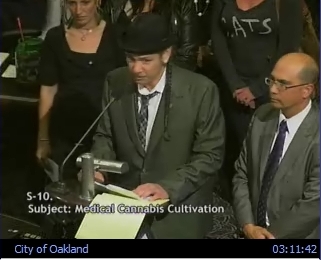
Steve Deangelo and James Anthony
"Harborside will apply under that system and try to create space inside its facilities to include as many of our existing 500 growers as we can," said Anthony. "It would be nice to give them an option to come into a regulated system."
The city council heard more of the same Tuesday night, with almost every public speaker calling on the council to address small and medium grows or put off a decision until the issue was addressed. "I support the idea of licensing and regulating cannabis cultivation in Oakland, but I think the council needs to pass a measure that has a way for small and medium growers to participate, 500 of whom are the heart and soul of the Harborside collective," said Harborside founder Steve DeAngelo. "It's not the role of government to pick winners and losers in the marketplace. Let's bring the small and medium-sized growers into the system. Let the market sort out what sort of cultivation it prefers."
"Dispensaries have been waiting three years to be able to cultivate our medicine off-site," said Keith Stevens of the Purple Heart dispensary. "This is an inherently flawed program. For you, the council, to take the right away from the dispensaries and transfer it to commercial ag is absolutely un-American."
"There is no reason to push the little and midsize growers out," Luis Santiago of Homegrown Wellness told the council.
"We consumers support moving toward licensed productions, but we have concerns this particular proposal is monopolistic and anti-competitive," Gieringer told the council. "I urge you to slow down and open the process up to competition."
The council didn't slow down, but it showed that it got the message loud and clear. "We're at a time when the medical cannabis industry is a growing and emerging industry and there is increased demand for permitted production facilities," said Kaplan. "We want to address concerns about fire danger and security, but also to provide opportunities for good paying jobs for local residents and revenue to fund basic public services. I support this ordinance, as well as the directions to return for the permits for the medium facilities."
Oakland has made history yet again. The first city to tax and regulate medical marijuana is now about to become the first city to permit, tax, and regulate industrial-scale marijuana production.
back to top
An unlikely pair of anti-prohibitionist insurgents are running statewide campaigns in New York designed to challenge the political status quo. Randy Credico, a comedian turned activist turned senatorial candidate, is challenging incumbent Charles Schumer for the Democratic Party senatorial nomination, while hedge fund manager turned madam turned convict Kristin Davis is running for governor on the Anti-Prohibition party ticket.

Randy Credico
Credico is familiar to the activist community as a relentless organizer against the Rockefeller drug laws from his post at the
William Moses Kunstler Fund for Racial Justice, while Davis's notoriety comes from her prosecution and four-month imprisonment as a "Manhattan Madam" who procured prostitutes for deposed former Gov. Eliot Spitzer. Both are proving adept at milking the media for all it's worth in a bid to bring their anti-prohibitionist messages to the public eye.
By all accounts, neither has a chance of winning outright. In the latest Siena Poll of New York politics, Credico was pulling 11% against Schumer, up from 9% last fall, but still hardly a close race. Davis has not figured in any polls, but is running as a third party candidate in a year when Democrat Andrew Cuomo appears to be a shoo-in in November.
Still, both are committed to doing all they can to bolster their campaigns and get the spotlight focused on their issues. Last week, the Credico campaign handed in signatures in a bid to qualify for the Democratic primary, while the Davis campaign is in the midst of a signature drive of its own.
"I'm exhausted, I just spent 38 days on the petitioning drive," said Credico on the way back from Albany after handing in signatures. "I'm sick. I have some bronchial problem. If Paterson signs the medical marijuana bill, I might be able to get some relief. We have enough signatures to get on the ballot. Now we have to wait to see if Schumer challenges us," Credico said.
That may be unnecessary, given that the state Democratic Party chair Jay Jacobs told the New York Daily News Sunday that Credico and his allies had not turned in enough signatures to make the party ballot. But whether he makes the Democratic ballot or not, Credico will be in the race. He is also on the ticket for both the Libertarian Party and Davis's Anti-Prohibitionist Party.
"Randy submitted 7,000 signatures himself, and one running mate submitted 6,500, and the third guy was supposed to submit 9,000, but only handed in 500," said Roger Stone, a Republican political operative who is friends with Credico and is advising Davis. "The next morning, the Democratic state committee was peddling the story that Randy had fallen short. I think the third guy was working with Chuck Schumer in a Nixon-style dirty tricks operation. Why does Chuck Schumer fear competition? Why deny people a vote?"
Stone might know a thing or two about political tricksters. He has a long history of political shenanigans, most notably a role in the infamous "Brooks Brothers riots" in Florida in the disputed 2000 presidential election, where mobs of angry Republicans rushed election offices as officials scrutinized chads. He denies any involvement in that.
"I'm a libertarian Republican, not a religious right or Moral Majority Republican," Stone said. "I'm pro-freedom, I favor gay marriage and the legalization of marijuana, casino gambling, and prostitution. The only way to get the pimps and drugs out of it is to regulate it. It's a $10 billion industry -- let's legalize it and run out the mob, the pimps, the guys who exploit women, let's empower women."
He is also critical of New York's drug laws. "The Rockefeller laws were racist," Stone said bluntly. "If you were a rich white kid, you could get a break. I think there's a difference between cocaine and marijuana, and I'm not for the legalization of heroin, but until someone can convince me marijuana is more dangerous than alcohol, I say legalize it. It's a harmless herb that grows from the earth, and the idea it's a gateway drug is horseshit. New York has millions of marijuana users and they didn't all turn into heroin addicts."
Whatever Stone's motives, he is pushing both anti-prohibitionist campaigns and played a key role in getting Davis into the governor's race. "I met Roger Stone on a Sirius radio show, and afterward, I approached him about lobbying for the legalization of prostitution," said Davis, whose blonde bombshell looks belie a keen intellect. "That was right after a woman who had worked for me was killed by the Craig's List killer in Boston. I feel very strongly she would still be alive if prostitution were legal. If one of his earlier victims had felt comfortable calling the police, he might have been caught before he killed," she said.

Kristin Davis
"My platform is pro-freedom," said Davis, adding that some of her issues are getting more play than others. "We've sort of moved into being most vocal on marijuana and gay marriage," she said. "These are the two issues that resonate most with people. New York is broke, deeply in debt, so we're looking at marijuana not so much as a social issue, but as an economic one."
Davis acknowledged that actually winning the governorship was unlikely, to say the least, but said her campaign was more about getting the issues addressed and getting enough votes to get the Anti-Prohibitionist Party official status in New York. "People say you can't expect to win, but that depends on your definition of winning," she said. "Andrew Cuomo has approval ratings over 60% and $23 million in campaign funds, but voting for me sends a clear message to the career politicians that these issues need to be heard. If we can get 50,000 votes for the party, then we're officially recognized and can lobby for our issues. Every single vote matters. Every vote for me shows the career politicians that New Yorkers care about these issues, that they want legal marijuana."
The anti-prohibitionist tag team has been doing some joint appearances, Davis said. "Randy is on my Anti-Prohibitionist Party petition as the Senate nominee. We just did an event over the weekend. It was a signature drive kickoff slash birthday party for me," she said. "There were maybe 300 people there."
Davis's notoriety has both helped and hindered her campaign, the former madam said. "It's a double-edged sword. Compared to sex, people by and large are not so interested in politics," she explained. "Sex gets people interested, and I'm an interesting character, but on the other hand, the mainstream media has been skeptical. The Post and New York One have not covered the campaign at all. I hope that once we're on the ballot, and they see this isn't a hoax, they'll start taking us a little more seriously."
"She's been able to use the celebrity that came out of her brush with Eliot Spitzer to her advantage to continue to point out the inequities of the criminal justice system," Stone said. "She went to prison, and he went back to his town house."
If politics makes strange bedfellows, anti-drug war politics makes even stranger ones. Stone is a libertarian Republican, Davis describes herself as a libertarian, but Credico comes out of a left-leaning social justice perspective. They don't agree on everything. For instance, Credico has come out in favor of allowing a mosque to be built near the former World Trade Center site, while Davis opposes it. Similarly, Credico touts an anti-war, anti-interventionist foreign policy, while Davis doesn't touch those issues.
"In the end," said Stone, "Credico and Davis become running mates and are on the same side. The drug war is one of the issues that motivates them both."
Whether he makes the Democratic ballot or not, Credico isn't going away. "We're going to start a war of attrition against Schumer," the activist/comedian turned candidate vowed. "We'll be making inroads in the black, latino, lesbian and gay communities, we'll be making inroads with people upstate concerned about their mortgages and credit cards. "I know Schumer is not happy I'm in the race," said Credico. "I'm the last person he wants challenging him. I have a show biz background, I have charisma."
But he also has street cred dating back to his days agitating against the Rockefeller drug laws. "I worked with the families of prisoners, I worked with the African-American community. That's what helped get me over the top. Women whose kids were incarcerated came out and canvassed for me. Schumer has nothing to offer them," Credico said.
Credico compares and contrasts his career with Schumer's and finds the incumbent fares badly. "I ran a civil rights organization, and he conducted himself as someone opposed to civil rights, as manifested by his support of the Patriot Act, the drug war, ID cards, the wall on the border, and other repressive measures. He's anti-civil rights, not for constitutional or civil rights for most Americans."
The Schumer campaign did not respond to emailed requests for comment.
"I'm for civil rights, human rights, a clean environment, and pulling out of Iraq, Afghanistan, and Colombia," Credico elaborated. "Schumer was going to waltz right in there without having to talk about this, and New Yorkers deserve better. Why is he an avid supporter of the drug war? Why isn't he as progressive as [Republican senators] Sessions and Hatch on the crack/powder sentencing disparity?" the long-time activist asked.
"I'm for legalization of marijuana," Credico continued. "We should be able to grow marijuana here, without taxing it. Let's not give the government any more layers of power. Prohibition has to be abolished. We have to talk about this. The drug war is a Trojan horse to incarcerate people of color for social control."
The Republicans and Democrats in New York have shown little taste for challenging drug war orthodoxy, but insurgent candidates Credico and Davis are determined to hold their feet to the fire when it comes to justifying prohibitionist policies. Let the games begin!
(This article was published by StoptheDrugWar.org's lobbying arm, the Drug Reform Coordination Network, which also shares the cost of maintaining this web site. DRCNet Foundation takes no positions on candidates for public office, in compliance with section 501(c)(3) of the Internal Revenue Code, and does not pay for reporting that could be interpreted or misinterpreted as doing so.)
back to top
Drug War Chronicle Book Review: Nicholas Schou, "Orange Sunshine: The Brotherhood of Eternal Love and Its Quest to Spread Peace, Love, and Acid to the World" (2010, St. Martin's Press, 305 pp., $24.99 HB)
Phillip S. Smith, Writer/Editor
As a teenager in remote South Dakota in the late 1960s and early 1970s, I had friends who traveled to Southern California and returned bearing strange gifts indeed: Orange Sunshine brand LSD, hash oil called "Number 1," Thai sticks. I had no clue at the time I was becoming a participant in a messianic drug-selling venture that spanned the world from its headquarters in Laguna Beach, but it turns out I was. That stuff my friends brought back from California was all thanks to the efforts of a group of Orange County surf bums and trouble-prone working class kids who took acid, got religion, and set out to change the world.
They ended up calling themselves the Brotherhood of Eternal Love, and "Orange Sunshine" is their story. And what a story it is! Led by a charismatic Laguna Beach street-fighter and troublemaker turned acid-washed mystic named John Griggs (who later died after taking a massive dose of synthetic psilocybin), the Brotherhood adopted as its mission the turning-on of the whole planet. What is shocking is how far they came in achieving their goal.
By the time the Brotherhood went down in flames in a massive federal bust in 1972, it had manufactured and distributed untold millions of doses of its trademark Orange Sunshine, it had pioneered the smuggling of Afghan hashish to the US, it had smuggled massive amounts of Mexican weed into the US, it provided a strong impetus for the formation of the DEA, and, strangely enough, it had made possible Maui Wowie and the Hawaiian pot boom of the 1970s.
The story of Maui Wowie is worth recounting, given that it demonstrates the scope of the Brotherhood's operations and the avidity with which its members went about their business. Wanting to finance another massive Afghan hash deal, Brotherhood members bought a boatload of Mexican weed and took it to Hawaii to sell before heading on to Afghanistan for the second part of the deal. Trapped in an endless, drug-fueled party on Maui, the Brotherhood never completed that deal, but someone there crossbred the Mexican weed with some Afghan pot plants and -- voila! -- Maui Wowie was born, and so was the Hawaiian pot industry.
Relying on interviews with Brotherhood members and the police who chased them, as well as court and newspaper records, OC Weekly writer Nicholos Schou spent four years tracking down the story of the legendary group and telling it in a rollicking, page-turning fashion. In so doing, he also opens a window on the beginnings of the acid era and the cultural turmoil of the late 1960s.
What jumps out at contemporary readers is the naivete and innocence of the time. Griggs and the other Brotherhood members really believed that LSD could change the world -- it certainly changed their world -- and set out with missionary zeal to make it so. Yes, there was money to be made, but for the idealistic Brotherhood, money was not an end, but a means. In fact, the Brotherhood bragged that it had knocked the bottom out of the Southern California hash market intentionally, because prices were too high.
Of course, idealistic zeal could hardly compete with cash, and before long, the Brotherhood and its members were acting like any other dope dealers, more interested in the bottom line than in blowing minds. Such a trajectory seems preordained today, but at the time, the holiness of LSD was supposed to lead us past such materialistic traps. That it didn't hardly seems surprising now, and I suppose that shows how far we've fallen.
Idealistic zeal also had a hard time dealing with pressure and betrayal. While Brotherhood members stayed remarkably loyal for years, one of them eventually cracked under police pressure (and because of disaffection with a group that had drifted from its noble goals), allowing the feds to roll up their operation in 1972. And Timothy Leary, the apostle of acid, whom the Brotherhood worshipped and who stayed with the Brotherhood in Laguna Beach, also turned on it, spilling the beans to the feds after being arrested in Afghanistan. What made Leary's betrayal sting even more painfully was the fact that the Brotherhood had financed the successful Weatherman/Black Panther effort to break Leary out of prison after he had been busted in Laguna Beach.
"Orange Sunshine" is full of great stories, but my favorite has to be the Laguna Beach Christmas party in 1970, when 25,000 hippies headed for Laguna Canyon for a Woodstock-style event. On Christmas day, a cargo plane hired by the Brotherhood flew over the gathering and bombed the crowd with several tens of thousands of hits of Orange Sunshine. Now, that's what I call a party!
But all parties must come to an end, and that was true for the Brotherhood as well, although, despite bold pronouncements from the feds that they had broken the group in 1972, individual members of the Brotherhood kept at their dope-dealing trade for years afterwards. All in all, "Orange Sunshine" is an eminently readable trip down memory lane to the beginning of the contemporary drug culture and a fascinating look at how a small group of high-minded kids ended up changing the world.
back to top
Do you read Drug War Chronicle? If so, we'd like to hear from you. StoptheDrugWar.org needs two things:
- We are in between newsletter grants, and that makes our need for donations more pressing. Drug War Chronicle is free to read but not to produce! Click here to make a donation by credit card or PayPal, or to print out a form to send in by mail.
- Please send quotes and reports on how you put our flow of information to work, for use in upcoming grant proposals and letters to funders or potential funders. Do you use Drug War Chronicle as a source for public speaking? For letters to the editor? Helping you talk to friends or associates about the issue? Research? For your own edification? Have you changed your mind about any aspects of drug policy since subscribing, or inspired you to get involved in the cause? Do you reprint or repost portions of our bulletins on other lists or in other newsletters? Do you have any criticisms or complaints, or suggestions? We want to hear those too. Please send your response -- one or two sentences would be fine; more is great, too -- email [email protected] or reply to a Chronicle email or use our online comment form. Please let us know if we may reprint your comments, and if so, if we may include your name or if you wish to remain anonymous. IMPORTANT: Even if you have given us this kind of feedback before, we could use your updated feedback now too -- we need to hear from you!
Again, please help us keep Drug War Chronicle alive at this important time! Click here to make a donation online, or send your check or money order to: DRCNet, P.O. Box 18402, Washington, DC 20036. Make your check payable to DRCNet Foundation to make a tax-deductible donation for Drug War Chronicle -- remember if you select one of our member premium gifts that will reduce the portion of your donation that is tax-deductible -- or make a non-deductible donation for our lobbying work -- online or check payable to Drug Reform Coordination Network, same address. We can also accept contributions of stock -- email [email protected] for the necessary info.
back to top
A California Legislative Analyst's Office report released Tuesday estimates that if Proposition 19, the Tax and Regulate Cannabis marijuana legalization initiative, were to be passed by voters, it could generate "hundreds of millions of dollars a year" in tax revenues in state sales taxes and taxes imposed by counties and municipalities that allowed for taxed and regulated sales and cultivation. Passage of the measure would also lead to reduced costs in state and local law enforcement, courts, and corrections, while not endangering public safety, the report said.
The Legislative Analyst's Office is a non-partisan state agency. Its job is to provide fiscal and policy advice to the state legislature.
The "hundreds of millions of dollars a year" estimate is roughly in line with, although lower than, the
State Board of Equalization's estimate that marijuana legalization could bring $1.4 billion a year in taxes and fees in the state. That estimate was based not on Proposition 19, but on an Assembly bill introduced by Tom Ammiano (D-San Francisco) that would have allowed for direct state taxation of marijuana. Under Prop 19, only cities and counties would have the ability to tax and regulate marijuana sales and cultivation -- although the state could, of course, collect a sales tax on anything sold in the state.
"Proposition 19 allows local governments to authorize, regulate, and tax various commercial marijuana-related activities," the report noted. "As discussed below, the state also could authorize, regulate, and tax such activities... we estimate that the state and local governments could eventually collect hundreds of millions of dollars annually in additional revenues."
The report warned, however, that firm estimates were hard to come by because of uncertainties, particularly those surrounding how the federal government would respond to California cities or counties moving forward to tax and regulate recreational marijuana sales.
With California laying off and furloughing state workers, and with California cities and counties doing the same with teachers, firefighters, and police officers because of ongoing budget crises, the Legislative Analyst's Office report is bound to become ammunition for Prop 19 supporters.
back to top
A national Angus-Reid poll released Wednesday has found majority support for legalizing marijuana, with 52% of respondents saying they wanted to free the weed. That figure includes 59% of independents and 57% of Democrats, but only 38% of Republicans.
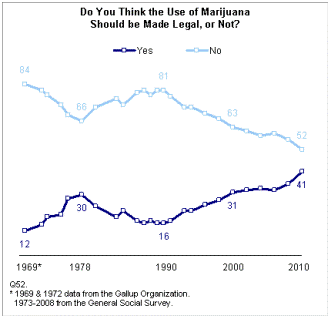
Gallup poll data, summarized in April Pew Research Center report
The 52% figure is almost identical to a
December Angus-Reid poll that found support at 53%. The difference is within the statistical margin of error. But the Angus-Reid polling finds higher support than
most recent polls, which show support nationwide for legalization somewhere in the forties.
Support for legalizing any other drugs was dramatically lower, with only 10% supporting legalizing Ecstasy, and only single-digit support for legalizing heroin, cocaine, or methamphetamine. The high levels of opposition to drug legalization cut across party lines.
The poll found that while a large majority (64%) believe that "America has a serious drug abuse problem," an equally large majority (65%) believe the war on drugs is a failure. Only 8% said the drug war was working.
The poll also surveyed attitudes toward Mexico and things Mexican. Some 78% respondents had favorable views of Mexican food, and 59% held favorable views of the Mexican people. But only 34% had a favorable view of Mexican immigrants (without distinguishing between legal and illegal) and only 7% had a favorable view of the Mexican government. The poll found that people who had actually been to Mexico tended to have more favorable view of things Mexican.
Nearly half (49%) of respondents believe Mexico deserves most of the blame for being a major drug supplier to the US, while 34% thought the US bore more blame. A majority (59%) of Republicans blamed Mexico, while only 49% of independents and 45% of Democrats did. Regionally, majorities of people in the West (54%) and the South (52%) blamed Mexico, while only 46% in the Midwest and 38% in the Northeast blamed Mexico.
back to top
More bad apples in the Big Apple, a major drug corruption scandal brews in Tulsa, the city of Oakland pays big for bad cops, a Georgia deputy cops a plea, and a South Carolina state trooper goes down. Let's get to it:
In Tulsa, Oklahoma, five current and former Tulsa police officers were indicted by a federal grand jury Tuesday in an ongoing probe into drug corruption in the Tulsa Police Department. Officers Jeff Henderson, 37, and Bill Yelton, 49, were indicted together in a 61-count indictment alleging myriad drug trafficking and conspiracy offenses, with Henderson named in 58 counts and Yelton in seven. Retired Officer Harold Wells, 59, was separately indicted on 10 counts that include conspiracy and possession of a controlled substance with intent to distribute. Officer Nick DeBruin, 37, was charged with six counts, including crack cocaine distribution and conspiracy to steal money. Officer Bruce Bonham, 52, was indicted on five counts including crack cocaine and methamphetamine distribution and conspiracy to steal US government funds. Henderson and Yelton face one count of threatening a former federal agent, Brandon McFadden, at gunpoint. McFadden has already pleaded guilty to a drug conspiracy charge and is cooperating with prosecutors. He admitted that he, Henderson, and other officer stole drugs and money, falsified reports, and perjured themselves. He also admitted that he and Henderson framed a father and daughter with a fake drug buy in 2007. That pair are among 11 people who were either released from prison or had prosecutions dropped because they were framed by Tulsa police. They are not through digging up the dirt in Tulsa -- prosecutors said more indictments could be coming soon.
In Oakland, California, the Oakland City Council voted Tuesday night to pay $6.5 million to more than a hundred people whose homes were searched by police officers who obtained search warrants by providing false information to judges. The payouts bring an end to two federal lawsuits filed by people who claimed a group of officers had lied on search warrant affidavits by saying seized substances had been confirmed by police laboratories as drugs, when no such tests had occurred. The city agreed to the settlement "to avoid the risk of an adverse verdict should this matter proceed to trial," wrote City Attorney John Russo in a document submitted to the council. The city fired four officers in connection with the case, but allowed seven others to keep their jobs after they argued they had been poorly trained or inadequately supervised.
In New York City, two NYPD officers were indicted July 15 for lying to cover up unlawful stops, searches, and seizures in Manhattan. NYPD Sgt. William Eiseman, 41, a 13-year veteran of the force, and Officer Michael Carsey, 29, are charged with perjury, offering a false instrument for filing, and official misconduct. Prosecutors portrayed Eiseman as a "renegade" who routinely stopped people for no justifiable reason, searched their vehicles, then arrested them when he found drugs or weapons. In one case, Eiseman and Casey unlawfully searched a van, testifying they smelled marijuana smoke and that the driver later told them he had drugs and weapons in his apartment. In fact, said prosecutors, the pair only learned of drugs by seizing the man's cell phone and looking at photos on it. They also lied in the search warrant application for the man's apartment. The pair have been released on bail. They face up to seven years in prison for perjury and up to four years on the false instrument charges.
In Atlanta, a former Fulton County sheriff's deputy pleaded guilty Wednesday in federal court to taking bribes to protect what he thought were drug dealers. Anthony Atwater, 33, is accused of providing protection for two different 500 kilogram loads of cocaine, but the people he was protecting it for turned out to be undercover FBI agents. Atwater got $4,000 for protecting the "dealers" during two drug transactions in January and March and was arrested in April. He originally faced five felony corruption, drugs, and gun charges, but ended up pleading to attempting to aid and abet the possession of cocaine with the intent to distribute, as well as bribery. He's looking at up to 20 years for corruption and up to 40 years on the drug count.
In Conway, South Carolina, a South Carolina Highway Patrol officer was arrested last Friday night on felony drug charges. Lance Cpl. Bobby Lee Spurgeon is charged with manufacturing, distribution or possession of a schedule II product, cocaine or a cocaine derivative. He made $10,000 bail on Saturday. He has been fired from the Highway Patrol. No further details were available.
back to top
by Bernd Debusmann, Jr.
Mexican drug trafficking organizations make billions each year smuggling drugs into the United States, profiting enormously from the prohibitionist drug policies of the US government. Since Mexican president Felipe Calderon took office in December 2006 and called the armed forces into the fight against the so-called cartels, prohibition-related violence has killed nearly 25,000 people (the Mexican attorney general put the death toll at 24,826 on Thursday), with a death toll of nearly 8,000 in 2009 and over 6,000 so far in 2010. The increasing militarization of the drug war and the arrest of dozens of high-profile drug traffickers have failed to stem the flow of drugs -- or the violence -- whatsoever. The Merida initiative, which provides $1.4 billion over three years for the US to assist the Mexican government with training, equipment and intelligence, has so far failed to make a difference. Here are a few of the latest developments in Mexico's drug war:
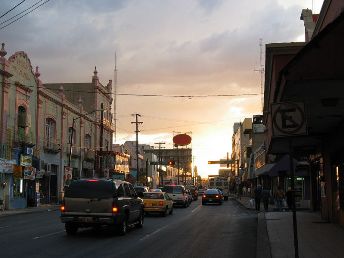
Ciudad Juárez (courtesy Daniel Schwen, Wikimedia)
In Ciudad Juárez, four people were killed when a car bomb blew up near federal police headquarters. The dead included two police officers, a doctor, and a paramedic. The Juárez cartel claimed responsibility and warned of more attacks if authorities do not crack down on the rival Sinaloa Cartel. This attack marks the first time such tactics have been used in Mexico's prohibition-related violence.
Sunday, July 18
In Torreon, Coahuila, 17 people were killed when gunmen opened fire in a crowded party without any warning after having blocked the exits. At least 18 people were also wounded in the attack, many of them seriously. Many of those in attendance at the event learned of it through Facebook. Torreon has seen several large-scale multiple homicides in recent months, especially after fighting began between the Zetas Organization and the Gulf Cartel. This battle has led to a drastic increase in violence in northern Mexico, including Coahuila.
Monday, July 19
In Guadalajara, Jalisco, three policemen were killed after being ambushed by gunmen in two separate incidents. In the first, two officers were shot dead in a car stereo shop. In the second incident, a police patrol car was attacked by armed men with rifles and grenades, leaving one officer dead.
Tuesday, July 20
In Ciudad Juárez, seven people were killed in several incidents across the city. Among the dead was a man found hanging from a bridge and a dismembered body which had to be pieced together from several locations.
Wednesday, July 21
In Nuevo Laredo, one person was killed and sixteen were wounded after a grenade attack on a sports complex.
Thursday, July 22
In a mountainous remote part of Chihuahua, eight gunmen were killed after a clash with soldiers near the town of Madera. Reports indicate that the incident occured after an army patrol came under fire from an unclear number of gunmen. It is unknown to which organization the gunmen belonged. The area is heavily used by marijuana and poppy growers under cartel control.
In Mazatlan, Sinaloa, two police officers were killed after being chased by gunmen. The chase ended when the two officers exited their vehicle and attempted unsuccessfully to escape on foot. In Guasave, a known drug-trafficking stronghold, a woman was shot dead by two gunmen as she held her baby. She was killed and the child was wounded. A police officer was killed in Nuevo Leon. In Colima, a man was shot dead after being ambushed as he drove on a highway.
In the city of Nuevo Laredo, the city government sent out a Facebook message warning residents to stay inside due to ferocious gun battles with cartel gunmen.
Total Body Count for the Week: 187
Total Body Count for the Year: 6,435
Read the previous Mexico Drug War Update here.
back to top
Oregon Secretary of State Kate Brown announced last Friday that an initiative campaign to allow state licensed medical marijuana dispensaries had handed in enough valid signatures to qualify for the November ballot. An initiative that would impose mandatory minimum sentences on repeat felony sex offenders and drunk drivers also qualified for the ballot.

marijuana plants (photo from US Fish and Wildlife Service via Wikimedia)
The dispensary initiative,
I-28, would amend the Oregon Medical Marijuana Act to mandate that the state Department of Human Services license and regulate dispensaries and producers. The dispensaries would be nonprofit and would be allowed to be reimbursed for their production costs. The initiative also contains provisions providing that the department set up a program for low-income patients and that the Department of Human Services conduct research into the efficacy and safety of medical marijuana. Those programs would be funded with fees generated by the medical marijuana program.
Under current Oregon law, patients or caregivers can grow their own, and caregivers can grow for up to four patients. But patient advocates have complained for years that the lack of a dispensary system has meant patients unable or unwilling to grow their own and who do not have a caregiver have had to resort to the black market or go without their medicine.
The initiative isn't officially qualified for the ballot just yet. It will be official on August 1, the deadline for verification of ballot initiatives. While it could theoretically be challenged between now and then, no such challenges have appeared on the horizon.
The initiative will not be known as I-28 on the ballot. It will be assigned a measure number on August 1.
The initiative is sponsored by Voter Power, the same folks who successfully sponsored the Oregon Medical Marijuana Act initiative in 1998.
back to top
Roger Christie, founder of The Hawaii Cannabis Ministry (THC Ministry), has been ordered held without bail after being arrested along with 13 current or former employees and growers by the DEA on July 8. He and the others are charged with marijuana trafficking offenses related to their alleged distribution of marijuana as a sacrament at the ministry.

Roger Christie (courtesy thc-ministry.org)
Christie had been raided by the DEA in March, with agents seizing cash and marijuana at that time, but not arresting him. Federal authorities allege that after that raid, Christie recommenced his marijuana distribution at the ministry. He and the others were secretly indicted last month.
Federal Magistrate Judge Kevin Chang originally ordered Christie held without bail at federal prosecutors' request. Christie and his public defender, Matthew Winter, last week filed a motion seeking his release, citing the nonviolent nature of the offenses, Christie's longstanding ties to the community, his lack of a criminal record, and his willingness to abstain from marijuana use or distribution pending trial.
A federal pre-trial services report also recommended that Christie be freed on bail. But prosecutors fought back with a 46-page memorandum in opposition. Because Christie allegedly recommenced marijuana distribution after the March raids, that made him "a danger to the community and... no conditions/combination of conditions could assure the safety of the community," they wrote.
On Friday, US District Court Judge Alan Kay agreed with prosecutors. Now, Christie will be held behind bars until trial because the pot-loving minister is "too dangerous" to be freed on bail.
back to top
A coalition of five drug reform organizations called Wednesday for the Obama administration to withdraw the nomination of Michele Leonhart to be DEA administrator. The career DEA veteran is currently the agency's acting administrator. The groups are the Drug Policy Alliance, Law Enforcement Against Prohibition, the Marijuana Policy Project, NORML and its California affiliate, California NORML, and Students for Sensible Drug Policy.
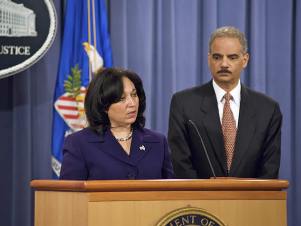
Michele Leonhart with Eric Holder
The call comes in the wake of recent DEA raids against medical marijuana providers in California, Colorado, and Michigan, including one two weeks ago in Mendocino County, California, aimed at the first person to register with the county sheriff under a new cultivation ordinance. Last year, Attorney General Eric Holder issued a memo instructing the Justice Department, of which the DEA is a part, to not persecute medical marijuana patients and providers who are in compliance with state laws.
In the Mendocino case, in which the DEA raided a collective garden that had been inspected and approved by the local sheriff, a DEA agent reportedly responded to being informed that the sheriff okayed the group by saying, "I don't care what the sheriff says."
The reformers also attacked Leonhart for her January 2009 refusal to issue a license to the University of Massachusetts to grow marijuana for FDA-approved research, despite a DEA administrative judge's determination that such a license would be "in the public interest." With that action, Leonhart blocked privately funded medical marijuana research in the US.
"With Leonhart's nomination pending, one would expect her to be more -- not less -- respectful of the Department of Justice and the rights of individuals in medical marijuana states," said Steve Fox, director of government relations at the Marijuana Policy Project. "Such behavior is an ominous sign for the future of the DEA under her leadership. Moreover, she has continually demonstrated her desire to block privately funded medical marijuana research in this country. The Obama administration has reversed many Bush administration policies over the past 18 months. It is time to transform the culture at the DEA by either withdrawing Leonhart's nomination or directing her to change her attitude toward medical marijuana."
"Michele Leonhart continues to wage war on sick people and their caregivers, undermining the Obama Administration's otherwise compassionate medical marijuana policy," said Bill Piper, director of national affairs for the Drug Policy Alliance. "Obama needs to withdraw her nomination and nominate someone who will follow the stated policies of his administration."
It's not just Leonhart's recent actions that are raising the alarm among reformers. As we reported when she was nominated, Leonhart had a close and friendly relationship with a serial perjuring DEA informant, "super snitch" Andrew Chambers, who was paid $2.2 million by the agency for his work between 1984 and 2000 despite repeated findings by federal courts that he was not believable. Leonhart defended Chambers and his credibility despite all the evidence to the contrary.
As Special Agent in Charge in Los Angeles during the height of the Clinton and Bush administration's persecution of medical marijuana users and providers, Leonhart was an enthusiastic participant and ranking DEA member involved. In January 1998, she stood proudly with then US Attorney Michael Yamaguchi as he announced at a press conference that the government would take action against medical marijuana clubs.
The administration has announced no timeline on moving her nomination forward.
back to top
In a decision that cuts against the grain of the European Union's laws governing free markets and the free movement of people within its borders, the EU Court of Justice has upheld the Dutch border town of Maastricht's bid to ban foreigners from its cannabis coffee shops. The ruling came last Friday.

downstairs of a coffee shop, Maastricht (courtesy Wikimedia)
Maastricht decided to limit admission to coffee shops to Dutch residents only, in a bid to stanch the flow of pot-seeking tourists, mostly from France and Belgium, who flood into the town conveniently close to the French and Belgian borders. City officials said 4,000 tourists a day come to Maastricht to score, and they make up some 70% of the border town coffee shop business.
The move prompted a legal challenge from Marc Josemanns, a coffee shop owner and chairman of the Association of Official Maastricht Coffee Shops. He argued before the Dutch council of state that the ban contravenes EU legislation on the free movement of citizens, goods, and services within the EU. The council asked the EU Court of Justice to interpret EU law, which it will then incorporate in its ruling later this year.
EU Court of Justice Advocate General Yve Bot found that drugs do not count as regular, legal goods because they are against the law. "Narcotics, including cannabis, are not goods like others and their sale does not benefit from the freedoms of movement guaranteed by European Union law, inasmuch as their sale is unlawful," he said. But marijuana does "come under internal market rules" in cases of medical or scientific use, he specified.
Since Maastricht was correct to view drug tourism as "a genuine and sufficiently serious threat to public order," Bot said, restricting foreigners from coffee shops "constitutes a measure necessary to protect the residents of the municipality from trouble."
Bot even went a step further, saying that pot heads descending on the Netherlands to get stoned and enjoy themselves was itself a threat to EU security. "Drug tourism, insofar as it conceals, in actual fact, international trade in narcotics and fuels organized criminal activities, threatens even the European Union's internal security," he said.
Of course, if the EU just legalized the drug trade, that would eliminate drug tourism at the Dutch border and deprive organized crime of revenues, but this appears to be too much to ask.
back to top
July 24, 1967: The Beatles pay for a full page advertisement in a British newspaper, which states, "The law against marijuana is immoral in principle and unworkable in practice." The ad calls for the legalization of marijuana possession, release of all prisoners on marijuana possession charges and government research into medical uses.
July 23, 1985: Tulio Manuel Castro Gil, judge of the Superior Court of Bogota, Colombia, is assassinated as he climbs into a taxi, following his indictment of Pablo Escobar for the 1984 murder of Colombian Justice Minister Rodrigo Lara Bonilla.
July 29, 1995: In an interview with the editors of the Charlotte Observer, Pat Buchanan says he favors measures that would allow doctors to prescribe marijuana for relief from certain conditions. "If a doctor indicated to his patient that this was the only way to alleviate certain painful symptoms, I would defer to the doctor's judgment," he says.
July 29, 1997: A large number of Los Angeles sheriff's deputies swarm into the home of author and medical marijuana patient Peter McWilliams and well-known medical marijuana activist Todd McCormick, a medical marijuana user and grower who had cancer ten times as a child and suffers from chronic pain as the result of having the vertebrae in his neck fused in childhood surgery. McCormick ultimately serves a five-year sentence, while McWilliams chokes to death on his own vomit in 2000 after being denied medical marijuana by a federal judge.
July 27, 2000: Referring to one of drug czar Barry McCaffrey's tired lines, Salon.com publishes "Fighting 'Cheech and Chong' Medicine," an article showing that the entire genesis of the government's new media campaign, the motivation for making the Partnership for Drug Free America's donated ad time and making it a billion dollars worth of taxpayer funds, was a direct response to the passage of medical marijuana initiatives in California and Arizona in 1996.
July 26, 2001: The British newsmagazine The Economist devotes an entire issue to drug policy, endorsing decriminalization and harm reduction.
July 25, 2002: The Hawaiian Tribune Herald reports: Marijuana eradication in Hawaii contributed to the increase in the use of the drug "ice," according to a three-year study prepared for the National Institute on Drug Abuse. The study's four-page executive summary states, "The use of ice in Honolulu had led to particularly serious physical and psychological problems and significant social disruption in poor working communities where it replaced marijuana, which had become scarce and expensive due to eradication policies... Residents were both pushed away from pakalolo [marijuana], their staple drug of choice, and pulled toward ice by a well organized marketing campaign by Asian distributors." It also notes that violence is more prevalent in the Honolulu meth users.
July 27, 2002: The Associated Press reports that a regional director of Mexico's main intelligence agency was slain in the border city of Tijuana, the 11th person killed over the last week in what authorities say is an escalating drug war.
July 26, 2003: The Honolulu Advertiser reports that a Hilo woman who smokes marijuana to treat her glaucoma received a check for $2,000 from her homeowners' insurance company for the loss of four plants stolen from her yard. Under a state law passed in 2000, patients with permits who are under a doctor's care may possess up to 3 ounces of marijuana and grow up to seven plants at a time for medical purposes.
July 28, 2003: James Geddes, originally sentenced to 150 years for possession of a small amount of marijuana and paraphernalia and for growing five marijuana plants, is released. Geddes had said, "How can it be that the President, his wife, the Vice President and his wife, the mayor of Washington DC, even the Speaker of the House can do these things, but I must pay dearly?"
back to top
Along with our weekly in-depth Chronicle reporting, DRCNet also provides daily content in the way of blogging in the Stop the Drug War Speakeasy -- huge numbers of people have been reading it recently -- as well as Latest News links (upper right-hand corner of most web pages), event listings (lower right-hand corner) and other info. Check out DRCNet every day to stay on top of the drug reform game! Check out the Speakeasy main page at http://stopthedrugwar.org/speakeasy.

prohibition-era beer raid, Washington, DC (Library of Congress)
Since last issue:
Scott Morgan offers: "Jane Hamsher Talks Marijuana Legalization on MSNBC," "Diane Feinstein Wants to Continue Arresting Marijuana Users, and Other News," "How to Get Arrested for Marijuana in One Easy Step," "The New Politics of Marijuana Reform," "DARE Attacks Marijuana Legalization While Praising Alcohol."
David Guard posts numerous press releases, action alerts and other organizational announcements in the In the Trenches blog.
Again, http://stopthedrugwar.org/speakeasy is the online place to stay in the loop for the fight to stop the war on drugs. Thanks for reading, and please join us on the comment boards.
back to top
Want to help end the "war on drugs," while earning college credit too? Apply for a StoptheDrugWar.org internship and you could come join the team and help us fight the fight!
StoptheDrugWar.org has a strong record of providing substantive work experience to our interns -- you won't spend the summer doing filing or running errands, you will play an integral role in one or more of our exciting programs. Options for work you can do with us include coalition outreach as part of the campaign to rein in the use of SWAT teams, to expand our work to repeal the drug provision of the Higher Education Act to encompass other bad drug laws like the similar provisions in welfare and public housing law; blogosphere/web outreach; media research and outreach; web site work (research, writing, technical); possibly other areas. If you are chosen for an internship, we will strive to match your interests and abilities to whichever area is the best fit for you.
While our internships are unpaid, we will reimburse you for metro fare, and StoptheDrugWar.org is a fun and rewarding place to work. To apply, please send your resume to David Guard at [email protected], and feel free to contact us at (202) 293-8340. We hope to hear from you! Check out our web site at http://stopthedrugwar.org to learn more about our organization.
back to top




